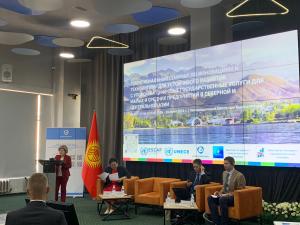
The potential of the creative economy to drive sustainable and resilient economic growth is high on the agenda of the participating States of the United Nations Special Programme for the Economies of Central Asia (SPECA), i.e., Afghanistan, Azerbaijan, Kazakhstan, Kyrgyzstan, Tajikistan, Turkmenistan, and Uzbekistan. At a time of economic uncertainty and limited financial resources, the creative economy represents an opportunity to capitalize on the rich cultural heritage of Central Asia to deliver sustained improvements in livelihoods, including in peripheral and rural areas.
Together with the Centre for Euro-Asian Studies (University of Reading), the United Nations Economic Commission for Europe (UNECE) organized a seminar on the creative economy in Central Asia. The seminar was hosted by the State Service of Intellectual Property and Innovation under the Government of the Kyrgyz Republic (Kyrgyzpatent) in Bishkek, with financial support from the British Academy.
Both strengths and challenges arise from the diverse nature of the creative economy – which embraces sectors as diverse as ICT, filmmaking, handcrafts and agritourism. While there is considerable resilience to be found in this diversity, there is also a challenge to policymakers that a “one size fits all” approach will not work. Nonetheless, with the right policy mix, the creative economy can be the key to building a national brand that may have significant benefits extending to other sectors of the economy, in particular export-based sectors.
The creative economy has been a significant driver of sustainable development in the Central Asian countries and received the support of various development partners – including United Nations entities such as UNDP and UNESCO, and international development banks.
During the seminar, speakers discussed the definition of the creative economy, data collection and analysis challenges, its economic resilience, development prospects and vehicles to fund creative businesses.
Importantly, in an interactive discussion with industry representatives from Kyrgyzstan, UNECE highlighted the potential of innovation infrastructures and the engagement of diasporas to support further development of the creative economy across Central Asia.
Further potential to use the UNECE-coordinated SPECA Network of Business Incubators and Accelerators for Sustainable Development (NBIASD) will be explored in the future.
The UNECE will continue building capacities in Central Asia to harness the potential of its creative and innovation ecosystem.
For further information, please visit https://unece.org/wg-on-itsd